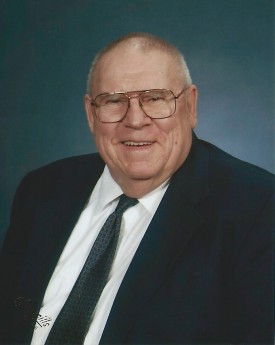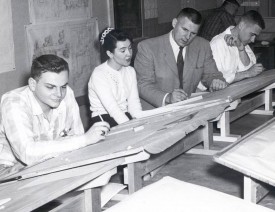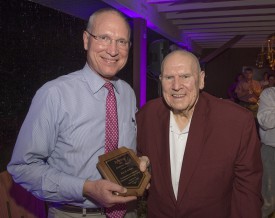
Roy H. DeBoer
What is a legacy?
It can be a bequest, as in a will. It can be a tradition that survives the test of time. It can be a body of work or set of values or an achievement that lives on after one retires or dies.
In the case of the late Professor Roy H. DeBoer, it is all of these.
Roy founded Rutgers’ landscape architecture (LA) program, and was a professor of LA from 1955 to his retirement more than 50 years later. He chaired the department for 25 years, and he designed the Evergreen Garden in Rutgers Gardens and the “Heron Rising” patio adjacent to the Cook Student Center, the setting for the moving Rutgers Rising memorial service each year. And his influence is felt far and wide.
Let’s start with his fabled EDA course. Officially it is Environmental Design Analysis, a course offered by the Department of Landscape Architecture as an elective, taught for decades by Roy mainly to first year students. But to the thousands of alumni who took the course in their freshman year, it was an experience that opened their eyes to the world and to realizations that would last a lifetime. As one alum recently put it: “I learned that bushes shouldn’t be shaped like meatballs, trees shouldn’t be round, and parks shouldn’t be concrete with a locked gate.” Another reported that even though his profession is food service and has nothing to do with landscape architecture, he still uses—30 years later—the DeBoer principles of foreground, background, texture, context, color, and more.

Prior to the landscape architecture program becoming accredited, DeBoer taught the Planting Design course. Photo circa 1964.
Then there is his beloved Rutgers Gardens. Roy was director of the Gardens for many years and influenced its development and design. He supported the Gardens with donations throughout his career. In 1998, his evergreen display was officially named the “Roy DeBoer Evergreen Garden,” and in 2013, he received the Hamilton Award for Dedication and Outstanding Commitment to the Rutgers Gardens, an award named after Bruce “Doc” Hamilton, Roy’s colleague and friend and his successor as director of the Gardens.
A deeply personal legacy is the Roy H. DeBoer Travel Prize in the Department of Landscape Architecture. Roy passionately believed that students should have an educational travel experience as undergraduates. For many years he led summer study-abroad courses for the department and saw the profound impact that travel has on the appreciation and study of landscape architecture. To encourage students to develop their own independent study-travel experiences, he founded and supported through his gifts a competitive Landscape Architecture Travel Prize that awards a stipend to help underwrite an educational trip.
These days, upwards of six students a year receive these stipends to travel domestically or abroad to study wide-ranging areas of interests from gardens to water catchment systems to composting techniques. Students have traveled to Japan, California, New Mexico, Italy, Rwanda, Chile, Iceland, Columbia, and many more places around the globe.

Kent Hiteshew (CC’76) presents the Dedication and Outstanding Commitment award to Roy DeBoer at the 7th annual Rutgers Garden Gala.
According to Laura J. Lawson, chair of the Department of Landscape Architecture, one requirement of the travel prize is a presentation that each student gives in the fall semester following the trip. She said Roy would attend these presentations and “speak from the heart” about the deep transformation that occurs with travel. “The Roy H. DeBoer Travel Prize continues to receive donations from alumni because they know it meant so much to him,” Lawson said.
Roy, who also was an alumnus (GSNB-Horticulture ’59), was especially proud of the fact that he succeeded in having landscape architecture recognized by the State of New Jersey as a licensed profession. In fact, he received LLA #00001.
One additional legacy that would have especially pleased him is the new Roy H. DeBoer Endowed Scholarship. A fund-raising effort was launched a few years ago by grateful alumni, and the endowment was achieved in record time. The department was planning an announcement and celebration of the scholarship honoring him. Sadly, Roy passed away on March 17, 2014, just days before the event.

